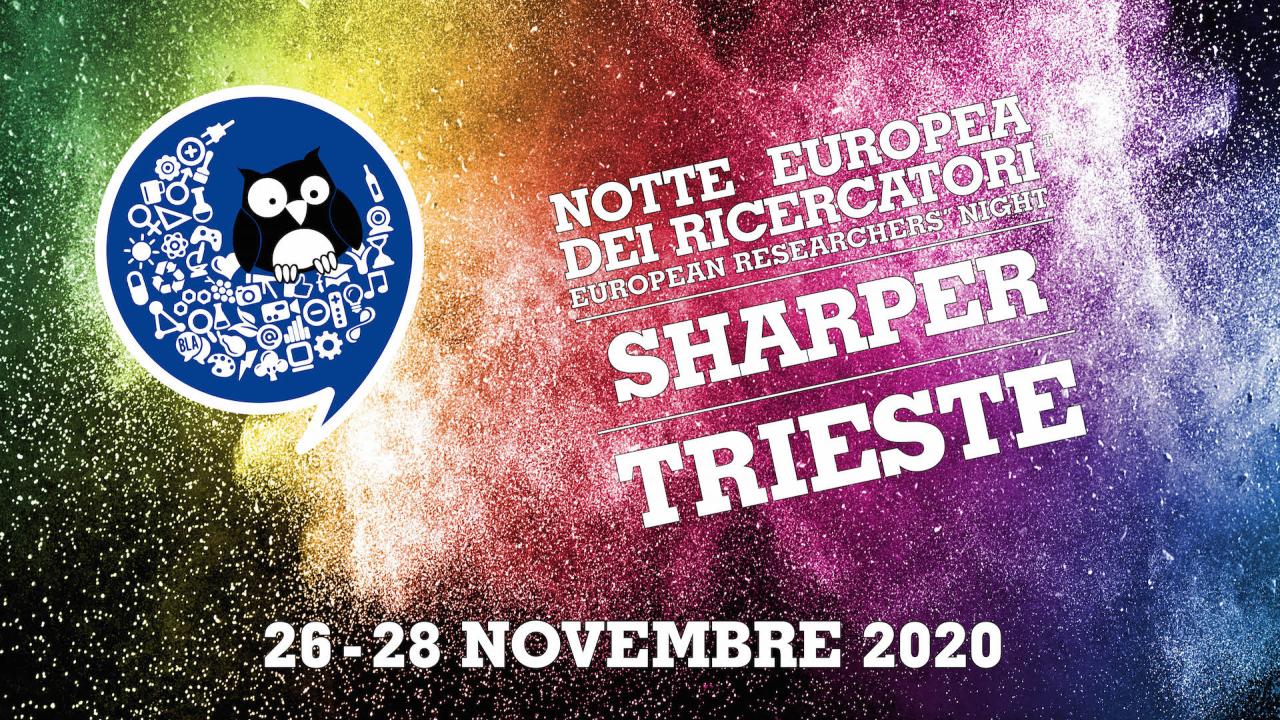
After the big science events of ESOF and TriesteNext last September, Trieste will confirm once again its status as Italy's city of science with a weekend full of science activities for the public, although in a virtual format to conform with the current measures against Covid-19.
From 26 to 28 November, Trieste’s SHARPER – the European Researchers’ Night - will offer a rich programme of activities, including meetings with researchers, virtual tours, and science games. This year's theme is the 17 Sustainable Development Goals adopted by all the United Nations member states to mitigate poverty, inequality, climate change and other global problems and to ensure that all people enjoy peace and prosperity by 2030.
The event will be launched virtually on Thursday 26 November, at 6.00 pm, with a panel on the topic of A.I. and intellectual property, from the newly established headquarters of Trieste’s science centre Immaginario Scientifico, in the renewed area of Porto Vecchio. All the activities will be streamed live and can be followed on www.immaginarioscientifico.it and on www.ilpiccolo.it (all events are in Italian).
In the morning of Friday 27 November there will be virtual tours of three main local institutions: Elettra, the synchrotron light machine; ICGEB, the International Centre for Genetic Engineering and Biotechnology; and INAF, the historic institution that hosts the Trieste Astronomical Observatory. At 3.00 pm another virtual tour will take the audience outside the national borders to one of the most famous science and research institutions in Europe: CERN in Geneva.
The tours will take place on Zoom, with registration via an online form on the Immaginario Scientifico website.
On Friday afternoon at 3:20 pm the main event will start, a marathon of short face-to-face meetings with researchers from Trieste's main science institutions. Live from Immaginario Scientifico’s Magazzino 26, 15 meetings of about 30 minutes each will be streamed, with researchers talking about their work and the role of research for a safer, fairer and more sustainable world. The meetings will be presented by a team of journalists and science communicators.
During this marathon, at 8pm, ICTP Telecommunications/ICT for Development Laboratory researchers Ermanno Pietrosemoli and Marco Zennaro will talk about “Technologies for a connected world”, focussing on their work on wireless networks. This is a field that has experienced a rapid growth in recent years and represents an incredible opportunity to contribute to the implementation of the program of the 2030 Agenda in the field of commercial and industrial applications and sustainability.
Zennaro and Pietrosemoli are particularly active in the field of wireless networks in developing countries, both from the point of view of research and training, having organized schools and workshops in various countries around the world. The promotion of communication technologies and low-cost data exchange is in fact a central node in the attempt to provide fair and sustainable growth and development opportunities.
For about ten years they have also worked in the field of the Internet of Things and its applications in developing countries. The Internet of Things (IoT), or the set of interconnected devices that communicate with the Internet, is a sector that is constantly progressing. IoT also play a crucial role to help achieve the 2030 Agenda for sustainable development, as it could be employed, for example, to reduce industrial production costs, for a better use and conservation of natural resources, to improve product quality, and so on.
Other speakers include TWAS’s Max Paoli, talking about “The world in 10 years. The United Nations 2030 goals”, with a focus on overpopulation, scarce water resources, excessive energy demand, access to education and social inequalities.
The implementation of the UN Agenda 2030 also requires a solid framework of indicators and statistical data, which allows the continuous monitoring of its objectives and correct information to all stakeholders. This will be the topic of a panel with Roberto Costa and Elena Marchesich, of the Istat territorial office for Friuli Venezia Giulia, who will talk about how statistical systems work in Italy, with a specific focus on the theme of "Gender equality".
Moreover, “Researchers fleeing for freedom”, with Roberta Altin, professor of Cultural Anthropology at the University of Trieste, and Feras Kharrat, PhD student of Medicine at the University of Trieste, will address the issue of forced migration and academic freedom in a historical moment of crisis, to emphasize the importance of an international scientific network in support of students and scholars in situations of risk.
These are just a few examples of the topics that will be discussed during the main event. The full programme can be found here (in Italian).
SHARPER Trieste will close on Saturday 28 November with some virtual science games: game and quiz sessions on Zoom, in which participants can have fun and test themselves, with the help and support of researchers. Games include Fish N'Ships, curated by OGS, that helps learning about marine species and different fishing activities and understanding the anthropogenic impact on the ecosystem; a climate crossword; and a special session of “energy horoscopes”, curated by INFN, that will provide special horoscopes based on new constellations derived from the gamma sources of the Universe.
The Researchers' Night is an initiative promoted by the European Commission, within the Marie Skłodowska-Curie actions.













